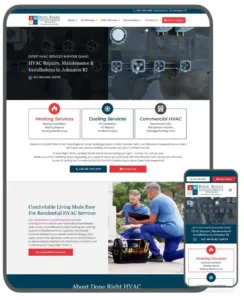Email marketing success often depends on finding the right software. The best email marketing software for small businesses is affordable and easy to use for email campaign creation, automation, reporting, lead nurturing, and triggered emails to increase conversions. We compared dozens of providers and narrowed it to the six best email marketing services to make your decision easier.
Based on features, overall value, cost, and usability, here are the best email marketing platforms for small businesses:
- Mailchimp: Best email marketing software for small businesses overall
- Sendinblue: Best platform for sending transactional emails like order confirmations, password reset emails, or delivery notifications
- HubSpot: Best free email marketing tools, with landing pages and a built-in customer relationship manager (CRM) for lead nurturing
- Constant Contact: Great email marketing service for small businesses needing basic ecommerce tools and integrations
- SendX: Top pick for cheap email marketing software, especially affordable for large contact lists
- ActiveCampaign: Best email automation tools for conditional drip campaigns
1. Mailchimp: Overall Best Email Marketing Software for Small Businesses
Mailchimp is the best email marketing service for small businesses overall thanks to its robust feature set, ease of use, and affordability. Plus, it’s fast becoming an all-in-one marketing hub. In addition to email marketing software, you will now find a website builder, landing page builder, built-in CRM, marketing tools for social media, and even direct mail postcard marketing.
However, Mailchimp’s bread and butter is still email marketing. It includes a variety of features to help you manage a master contact list, create email campaigns, automate triggered email sends, segment your audience, and analyze the success of each campaign you send. It’s easy to build web forms in Mailchimp and then embed them on your website and on social media to streamline list building and lead generation.
2. Sendinblue: Best for Sending Transactional Emails
Sendinblue has a bevy of tools to promote your business, generate and nurture leads, and stay in touch with current customers. It offers a free plan that limits you to 300 emails per day, whether they are marketing or transactional in nature. The number of contacts you can have is never limited, regardless of which plan you choose.
Most businesses rely on transactional emails to communicate with customers when they make online store purchases or users who make changes to their accounts. Set up automated transactional emails with order confirmations to send invoices or to provide updates on shipping and delivery to keep customers aware of what they purchased and when it should arrive.
Transactional emails are helpful in other ways, such as when a customer requests a password reset for their account or changes their password or login information, or for double opt-ins when someone subscribes or sets up an account. Managing all these types of emails manually would take way too much time, which is why you should use an email tool like Sendinblue.
Transactional emails often involve more than one software application. Sendinblue won’t let you down in this area, with dozens of ready-to-plug-and-play third-party integrations as well as Zapier, which can facilitate thousands more.
3. HubSpot: Best Free Email Marketing Tools for Lead Nurturing
HubSpot is well-known in the marketing world for its data studies, free tools, and as a comprehensive sales and marketing platform. Email marketing and the HubSpot CRM are included among the free tools, so you can build your mailing list at zero cost. HubSpot is also an excellent email marketing service for list management, with advanced tools for segmenting audiences and personalizing campaigns.
The drag-and-drop landing page builder by HubSpot is another free tool you can use to increase email campaign conversions. Use one of many templates and simply change the images and content to suit your business.
HubSpot templates are all mobile-friendly; they are as easy to view on a mobile phone as a desktop. Each template is designed to produce conversions, from getting people to visit a landing page to signing up for a demo or purchasing a product from your website.
4. Constant Contact: Best Software for Basic Ecommerce Sellers
Constant Contact started its life as event management software but evolved into a cross between a CRM and an email marketing tool. It integrates seamlessly with ecommerce platforms like Shopify and has loads of customizable templates.
One of the most appealing features of Constant Contact is easy integration with and the ability to add products from your Shopify store to marketing emails. Similar to Mailchimp, the drag-and-drop email editor is easy to use, and Constant Contact offers about twice as many templates as other providers. Also, Constant Contact doesn’t limit the number of emails you can send per month.
5. SendX: Cheap Email Marketing Software for Large Contact Lists
SendX is far and away one of the cheapest options for startups and small businesses. While there is no free plan, pricing starts under $8 per month, and the cost increases level-to-level based on the size of your contact list are modest, especially compared to Constant Contact, HubSpot, and even Mailchimp.
While we haven’t talked a lot about user reviews for other providers, it’s worth a mention here. SendX has very high user ratings (e.g., 4.6 out of 5 on G2) and many SendX reviews especially citing the quality of customer care they received. For startups and solopreneurs who have to do it all marketing-wise, this type of support is invaluable.
Another thing to like about SendX is that advanced features aren’t locked behind higher tiers. Every user gets access to drip campaign automation, A/B split testing, web forms, and conversion-generating features like auto-responders, triggered and condition-based automation, and list segmentation.
6. ActiveCampaign: Best for Email Marketing Automation
ActiveCampaign has the most advanced email marketing automation capabilities. If you have fewer than 2,500 contacts, it’s more affordable than marketing automation juggernaut HubSpot. There are many different options for automating emails, such as time triggers to encourage more opens and action or behavioral triggers, like after a contact opens an email or clicks a link.
Since ActiveCampaign includes a multideal sales CRM beginning with the Plus plan, HubSpot is its closest competitor feature-wise. The sales CRM includes deal assignment, pipelines, and lead scoring, and uses machine learning to send email content when a lead is most likely to convert. Beginning with the Plus plan, get integrations with more than 870 apps, including Shopify, WooCommerce, and BigCommerce.
Here are the factors we considered in choosing the best email marketing platforms:
- Cost and fees: To be accessible to small businesses, software must be affordable. We considered whether a tool offered a free version or free trial as well as the overall cost and pricing structure of each platform.
- Ease of use: We only chose apps easy to learn and use, otherwise a business might not get the maximum value or results they need to grow. Ease of use also impacts overall value for the money.
- Features: Regardless of primary functionality, the best services offer robust features, including features to boost marketing emails from good to great and provide a good return on investment (ROI).
- Customer reviews: How current customers rate and what they say about a company is one of the best ways to find out whether it’s right for your small business. We considered what customers had to say and how they ranked each company on our list.
Source credit: https://fitsmallbusiness.com/best-email-marketing-software/





